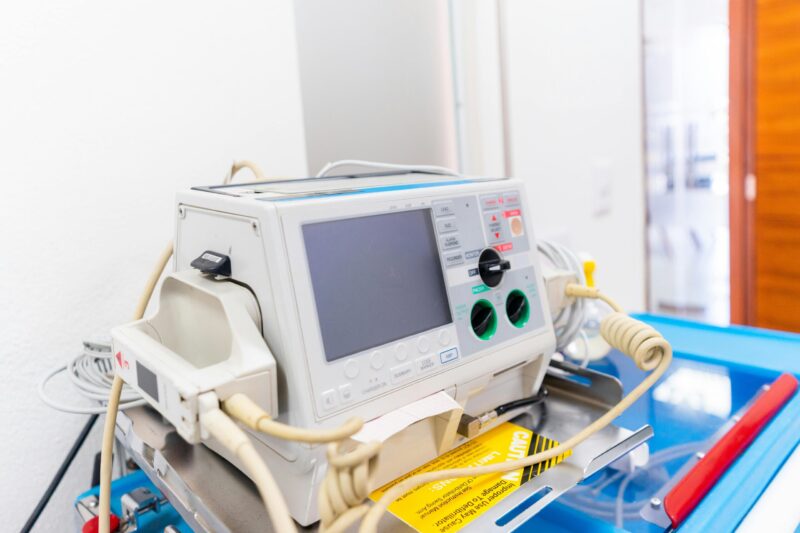The need for prompt cardiovascular care is increasing daily, given the rise in heart and vascular diseases. Equipping your cardiology department with the right Cardiology Equipment is not only important for delivering high-quality cardiovascular care but also for staying at the forefront of medical advancements. Read on as we explore the crucial equipment needed for a well-equipped cardiology department, ranging from diagnostic tools to life-saving devices.
1. Cardiac Ultrasound Machines
Cardiac ultrasound machines, also known as echocardiography machines, are indispensable for non-invasive imaging of the heart. They provide real-time visualizations of the heart’s structure, function, and blood flow, aiding in the diagnosis of various cardiac conditions.
Look for machines with advanced imaging capabilities, such as 3D/4D imaging and Doppler technology. Portable options can enhance flexibility in conducting bedside examinations.
2. Vascular Ultrasound Machines Cardiology Equipment
Vascular ultrasound machines are essential for assessing blood flow in arteries and veins. They are used to diagnose conditions such as peripheral artery disease (PAD), deep vein thrombosis (DVT), and carotid artery disease.
Opt for machines with high-resolution imaging and Doppler capabilities. Consider devices that allow for both vascular and general imaging to maximize utility.
3. ABP Monitors (Ambulatory Blood Pressure Monitors)
ABP monitors are crucial for monitoring blood pressure over a 24-hour period, providing a more comprehensive understanding of a patient’s blood pressure variations throughout the day and night.
Look for monitors with comfortable cuffs, accurate measurement technology, and the ability to store and analyze data. User-friendly software for data interpretation is also valuable.
4. Electrocardiogram (ECG) Machines
ECG machines record the electrical activity of the heart, aiding in the diagnosis of arrhythmias, heart attacks, and other cardiac abnormalities.
Consider machines with multi-lead capabilities for a more detailed assessment. Portable ECG devices can be advantageous for conducting tests in different areas of the hospital.
5. Fetal Monitor
Fetal monitors are essential for monitoring the heart rate and movements of the fetus during pregnancy. In a cardiology department, these monitors are crucial for assessing the impact of maternal cardiac conditions on fetal well-being.
Look for monitors with multiple parameters, including fetal heart rate, uterine contractions, and fetal movements. Wireless connectivity and ease of use are additional factors to consider.
6. Pulse Oximeter
Pulse oximeters measure the oxygen saturation levels in the blood, providing vital information about a patient’s respiratory status. They are essential in both critical care and outpatient settings.
Choose pulse oximeters with accurate and fast readings. Some models offer additional features like plethysmographic waveforms and Bluetooth connectivity for data transfer.
7. Spirometer
Spirometers measure lung function by assessing the volume and flow of inhaled and exhaled air. They are crucial for diagnosing and monitoring respiratory conditions, which often coexist with cardiovascular issues.
Look for spirometers with user-friendly interfaces and the ability to measure a variety of parameters, including forced vital capacity (FVC) and forced expiratory volume in one second (FEV1).
8. Defibrillators
Defibrillators are life-saving devices that deliver an electric shock to the heart to restore normal rhythm during cardiac arrest. In a cardiology department, having reliable defibrillators is essential for immediate intervention in emergency situations.
Ensure that your defibrillators are equipped with advanced features like automated external defibrillator (AED) functionality, clear visual prompts, and easy-to-use interfaces.
9. Vital Sign Monitor
Vital sign monitors provide continuous monitoring of key physiological parameters, including heart rate, blood pressure, and oxygen saturation. They are Cardiology Equipment essential for tracking a patient’s overall condition during various medical procedures .
Opt for vital sign monitors that offer accurate and real-time readings. Some models come with advanced features like arrhythmia detection and customizable alarm settings.
10. Automated External Defibrillator (AED) Machine
AEDs are portable defibrillators Cardiology Equipment are designed for use by individuals with minimal training. Having AEDs strategically placed in your facility can significantly increase the chances of survival in cases of sudden cardiac arrest.
Look for AEDs with clear audio and visual prompts, as well as features such as CPR guidance. Battery life and ease of maintenance are also important considerations.
Conclusion
A well-equipped cardiology department with the best Cardiology Equipment is essential for providing comprehensive and effective cardiovascular care. The equipment mentioned above, from advanced imaging tools like cardiac ultrasound machines to life-saving devices like defibrillators and AEDs, forms the backbone of a modern cardiology facility.
When selecting equipment for your cardiology department, it’s crucial to consider factors such as technological advancements, and ease of use. By investing in high-quality and up-to-date equipment, you not only enhance the capabilities of your cardiology team but also contribute to improved patient outcomes and overall cardiovascular health.


Write a comment
Your email address will not be published. All fields are required